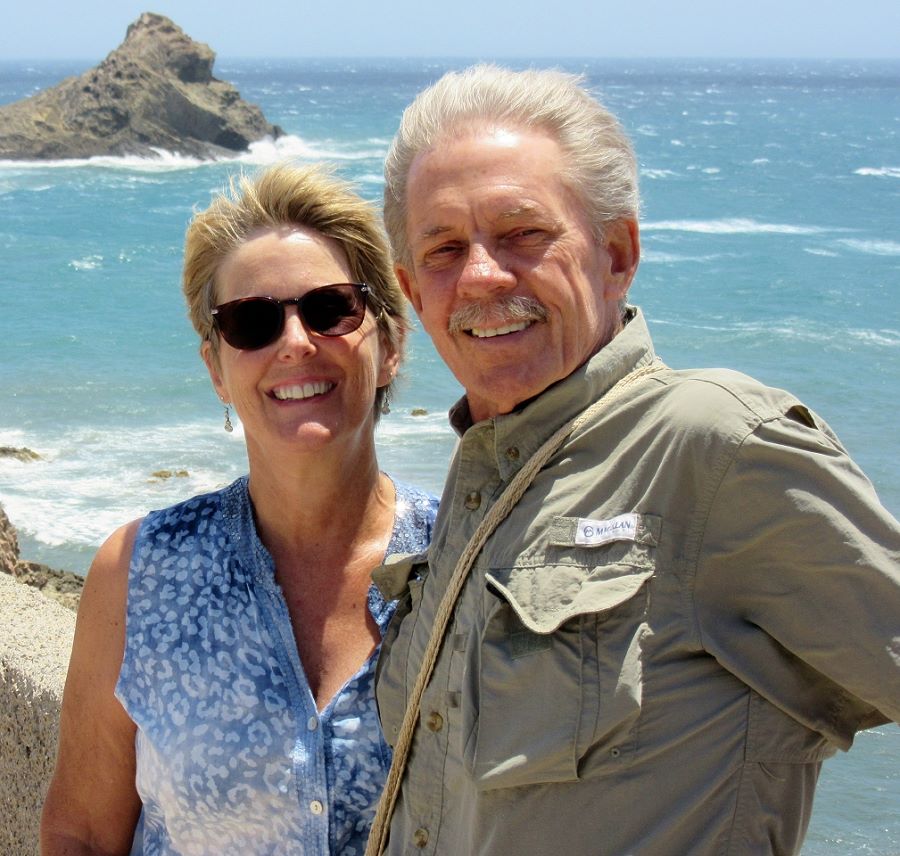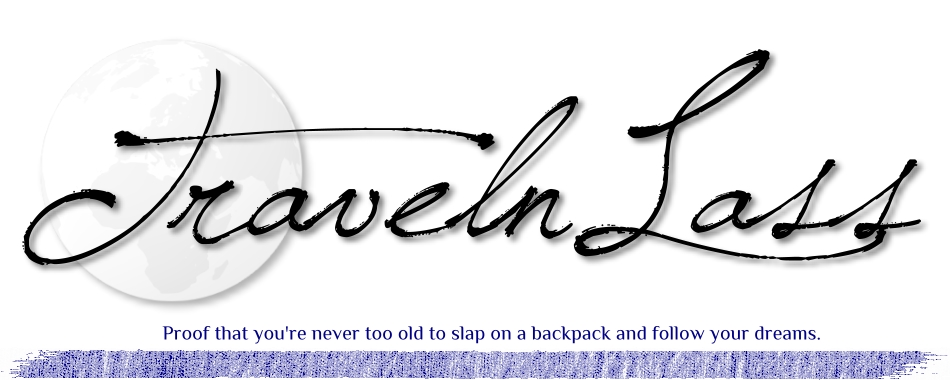Take a Great Leap [Interview]: Anita in Lagos, Portugal
From emails sent in by TL readers, it seems that many of you are dreaming of likewise taking the “Great Leap – toying with the notion of becoming an expat and/or likewise teaching English in some g-forsaken Asian rice paddy (or Ecuadorian jungle, or forgotten hamlet in rural China – you get the picture). And though I can now personally attest that it was the very…
…nonetheless, I well understand that making the Leap is no small step. Indeed, I acutely remember how terrified I was nearly 7 years ago, that I would either end up a beggar on the streets of Saigon, else go screaming back to my beloved Seattle… shamed and penniless.
So I started this little “Great Leap” interview series here at TravelnLass that picks the brains of my fellow nomads that have likewise taken the Great Leap. Admittedly it’s been awhile since I posted a new Great Leap interview (the first with Mary – who followed my breadcrumbs to Vietnam 5 years ago, and now teaches in Egypt) and most recently with Patti in Saigon.

And now we have Anita, who with her husband Richard, diligently scouted out various countries before dropping anchor in beautiful Lagos, Portugal. You can follow her many tales of both her travels and living in Lagos at her excellent blog:
Welcome my dear, and thanks for sharing your “Great Leap” experience with TravelnLass readers.
[Click on any of the Questions to reveal Anita’s answers. Click the question again to close the answer]
Q: First (easy-peasy) question: Can you tell us a little bit about yourself (e.g. where are you originally from? Background? Where are you living now, and for how long?)
A: I’m originally from Southern California and my husband is a native Montanan. We’re both graduates of the University of Montana: I was a pharmacist and he was a human resources director. We have one son and one grandson. We now live in Lagos, Portugal where we’ve been for two-plus years.
Q: Why did you take the Great Leap and move lock, stock ‘n barrel to a foreign land?
A: I had what I call ‘the big epiphany’ in 2011 where I realized how unhappy I was with my career and that working to maintain our current lifestyle was not what I wanted. After talking to my husband who’d been downsized and had taken an early retirement, we realized we both wanted to go in a different direction. We talked, we researched and figured out that the only way we could afford for me to retire early was to live outside the US.
Q: Speaking of “lock, stock ‘n barrel” – what did you do with your “stuff” in prep for your Great Leap? (i.e. did you sell a house/car, sell/store/ship some/all of your “stuff”?)
A: We spent a year selling or donating everything we owned except our house which we rented out for a couple of years before selling it too. Our son picked out things he wanted (we called it an early inheritance) and everything else went. We ended up with a few files which my sister has.
Q: How much previous travel/expat experience did you have before your Great Leap?
A: We’d lived in Montana, California, Idaho and Texas during our working lives and had traveled in several states and Mexico for vacations. Neither of us had ever lived outside the US.
Q: What was the most daunting issue for you in making the Leap?
A: The question of what to do with all the stuff we’d collected and amassed over 30-plus years of married and family life was probably the most daunting. We took the year between our decision and go date to slowly shed ourselves of the stuff and in the end we viewed it as an impediment between us and our goal. Our mantra was, “Sell it, donate it, get rid of it!”
Q: Why Portugal? What were your top 3 considerations when choosing your present Great Leap foreign destination?
A: We slow traveled full-time for three years in Mexico, Central and South America as well as the Dominican Republic and Curacao. In each place we’d ask ourselves, “Could we live here?” We had two places that we thought might work – Merida, Mexico and Granada, Nicaragua – but, after starting our European travels in Spain and then Portugal, we knew we’d found our place. There are so many reasons to choose Portugal: It’s affordable, the practicalities of getting a resident’s visa are doable, the country is beautiful, the people are friendly, the climate is mild, the food is healthy and delicious, and IT’S IN EUROPE!
Q: What sort of visa do you have to live there long-term (and how difficult was it to obtain?)
A: You need to have a resident’s visa to stay in Portugal longer than 3 months. The visa needs to be applied for at a Portuguese Embassy or Consulate in your home country. If you’re an American citizen, you need an FBI background check, proof of international health insurance, proof of income or savings, etc. It’s a matter of working through the steps and requires patience, but it’s not difficult. The first residence visa is good for 4 months and then you’ll renew it with the immigration office in Portugal.
Q: Clearly rubles matter with such a major move. Can you share the financial details about making such a lifestyle leap? Do you have a pension and/or lump savings to rely on?
A: My husband receives a social security check and we have savings to make up the difference. Unlike so many baby boomers, we’re fortunate not to have any debts either in the US or here. I’ll receive my social security in 2019 so our savings will take less of a hit.
Q: How much did you pack/bring with you to your new foreign home; what do you wish you hadn’t brought, and what do you wish you had?
A: Since we’d sold everything before we started traveling full-time, we brought over a couple of suitcases each with clothing, a six month supply of medications and our computers. Our apartment is furnished and we’ve been able to find everything we need/want here.
Q: Do you speak the local language of your new home (and how did you go about learning it)?
A: Because there are a lot of British expats here, English is widely spoken throughout the Algarve region. That makes it easy to get settled but doesn’t help much as far as learning Portuguese which (we think anyway) is a very difficult language. My husband is taking Portuguese lessons twice a week and I’m planning to quit procrastinating and begin studying in 2018.
Q: Do you mainly socialize with other expats or do you seek out local friends?
A: We’ve made a variety of friends in both the expat community (mostly made up of Brits and other Europeans in this area) and local Portuguese who we’ve met at restaurants, language classes, and various groups we’ve joined. We’ve also met and made friends with a great community of people who have read our blog and have come to check out Portugal for themselves.
Q: What should folks know before choosing to move to a foreign land?
A: In addition to doing some initial research, take an exploratory trip for yourself and try to live locally versus living like you’re on vacation. Shop in the grocery, household, and clothing stores, visit various towns in the area, visit a place during the worst season of the year (Winters too cold? Summers too humid?) and get an idea of what the rental market is like as well as what transportation is in place (buses, trains) or if you’ll want a car. Read the online magazines critically and find out for yourself what works for you. We’ve been to many “expat havens” and found them to be far from our idea of a good place to live. And, friends of ours who visited us this summer, found our idea of a perfect place to be too quiet and rural, opting instead for a large city north of us. However, I think the biggest takeaway point is to rent for several months. There really is a ‘honeymoon’ phase to expating and we’ve met a lot of people during our travels who are literally stuck in a place they hate after buying their dream home.
Q: What do you miss most/least about your native land?
A: We Skype with our son and grandson at least once a week and make an annual trip back to the US but missing them is really the number one thing on our list. This year, they plan to visit us. We don’t miss the stress that our friends and family take for granted, the constant need to be busy, the emphasis on stuff or the divisive politics.
Q: How do you keep in touch with family/friends in your native land?
A: E-mail, Facebook and Skype.
Q: What’s the BEST and what is the WORST thing about your experience?
A: This is our sixth year out of the US and it’s been one of the best decisions we’ve ever made. We’ve learned that you can make a home and find friends anywhere. Perhaps the worst thing about the experience is that we didn’t think of making the leap a lot sooner!
Q: How is living as an expat different from traveling?
A: The biggest thing we missed when traveling full-time for three years was the sense of coming back to a familiar place and knowing where things are and how they work. As much fun as finding new cities, restaurants, lodgings, etc. can be, it’s exhausting sometimes to keep landing in a new place where the money, language, food, etc. are totally different. It’s great to have a network of friends to meet with, know where the stores and ATM’s are and how to navigate your way through cultural differences.
Q: What is your long range plan now that you’ve made the Great Leap? Do you have any current travel plans? Would you ever consider moving to a different country or back to your native land in the future?
A: We see the Algarve Region of Portugal as our home (we just celebrated our 3rd Christmas here) and don’t plan to return to the US except for visits. I have a few travel plans in place for 2018 starting with a solo trip to Vietnam and Cambodia. Both of us plan to explore more of Portugal and Spain this Spring and travel to a few Eastern European countries later in the year.
Q: A couple of practical questions specific to your current adopted home: What is the range of prices to rent a furnished/unfurnished 2 bedroom apartment? And what would be the minimum monthly cost (no frills/luxuries, but comfortably) to live there?
A: We rent a modern, furnished 2 BR, 2 BA apartment for €800/month. There are also rentals under €500 in smaller towns away from the coast and north of Lisbon but I’d plan on €700 to €1200 along the popular coast of the Algarve Region.
Q: Knowing what you know now, what advice would you give yourself/TL readers before embarking on this Great Leap?
A: Go slow and savor each experience. Accept that things are different (that’s what you want after all) and don’t compare them to how things are done in your native country. Allow yourself time to process (and maybe appreciate) the differences and don’t take on too much in a day. There’s time and taking the great leap is all about finding a new direction in life! 😉
Thanks so much for sharing, Anita. No doubt there’s at least one TL dreamer out there that will be grateful for so many details of your unique Great Leap experience.
And to All the TL eyeballs out there reading this – we each have different circumstances, different budgets, different goals, and different druthers when it comes to taking that Great Leap. But Anita’s tale is just one more example that it CAN be done. Even we folks “of a certain age” can follow our dreams, and start a whole new life in some exotic corner of the world.
And furthermore, did I uh, neglect to mention?
 |
 |







 Off-the-beaten-path travel is my passion, and I’ve always lived life “like a kid in a candy store” – eager to sample as many flavors as I can. Indeed, my life motto has long been:
Off-the-beaten-path travel is my passion, and I’ve always lived life “like a kid in a candy store” – eager to sample as many flavors as I can. Indeed, my life motto has long been:










Thanks for featuring me in this post, Dyanne and for giving a shout out to our blog. We had so many questions at the beginning of our big adventure when we decided to shuck the version of the American Dream that we were living and radically change our lives. It’s great to be able to talk about it with others who are considering a lifestyle change and say, “Yes! Lots of people have done this and you can too!”
Indeed Anita – so much for the “American Dream”. It clearly isn’t everybody’s cuppa tea. And though each of our “Great Leap” stories is different, the bottom line is: YOU.CAN.DO.IT.TOO. There’s LOTS of we “Great Leapers” out there, so jump on in – the water’s juuuuust fine! 😉
Thanks for this. Always good to hear details about expat places.
Glad you found Anita’s expat story helpful, Christine. Do be sure to read the other two Great Leap tales (Mary’s and Patti’s) here as each one is unique.
AIS, uprooting oneself to live in a foreign land can be daunting (to say the least). And we’re each completely different in what will, and will not work for us.
But as evidenced here, making the “Great Leap” CAN be done – and might just be the very BEST THING you’ll ever do.